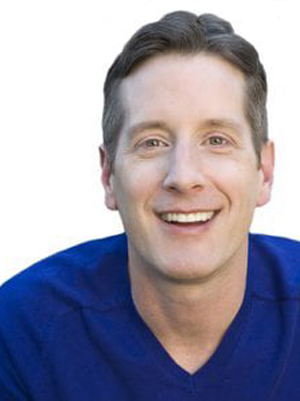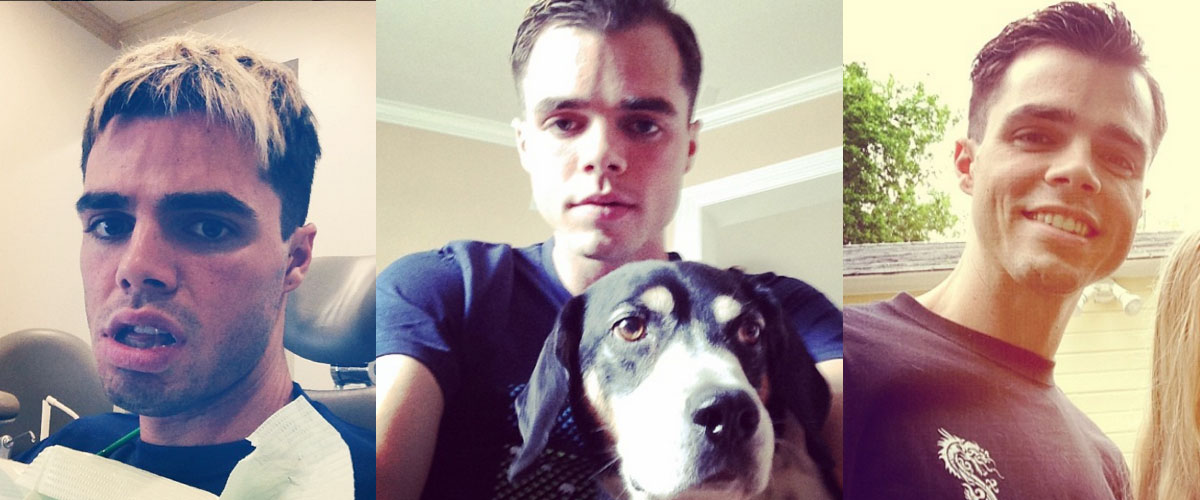In an open letter on the Huffington Post, actor Reid Ewing, who is most well known for his role as Dylan on Modern Family, opened up about his battle with body dysmorphia.
“Body dysmorphic disorder is a mental illness in which a person obsesses over the way he or she looks,” the actor said. “In my case, my looks were the only thing that mattered to me. I had just moved to LA to become an actor and had very few, if any, friends. I’d sit alone in my apartment and take pictures of myself from every angle, analyzing every feature.”

He continued on to talk about how he then underwent a number of back to back cosmetic surgeries, each making him more and more paranoid. It all caused him to hide from his friends and family and place an importance on secrecy that eventually took a huge toll on him. “…all the isolation, secrecy, depression, and self-hate became too much to bear,” he said. “I vowed I would never get cosmetic surgery again…Plastic surgery is not always a bad thing. It often helps people who actually need it for serious cases, but it’s a horrible hobby, and it will eat away at you until you have lost all self-esteem and joy. I wish I could go back and undo all the surgeries. Now I can see that I was fine to begin with and didn’t need the surgeries after all.”
It’s hard to know when someone has body dysmorphia in an age where looks are so easily and freely discussed and selfies are so prevalent. How much body talk is too much? And what constitutes obsessive? “Always be on the lookout for obsessive behavior,” says Psychologist Kathleen Murphy who works with the Breathe Life Healing Centre, a rehab facility that specializes in treating a wide variety of addictions, underlying psychological issues and trauma. “If you see someone more than just casually concerned with their physical appearance, or certain parts of their body, this can be the first sign of an obsession. Obsessive behavior does not respond to reason and they will often experience a constant need for approval. You will see them do things like constantly checking themselves in the mirror or excessively grooming.”
Obsessive behavior can affect an individual in more ways than they could even realize. “ They may take a small unnoticeable flaw and become hyper focused on it,” says Murphy. “This can result in a lack of them wanting to participate in certain group activities. Even with an excessive amount of reassurance you may still find them to be inconsolable and unable to receive messages of comfort that would ease their concerns.”
As an outsider, simply starting a healthy conversation can help someone who has the condition to open their eyes to it and perhaps admit that they need help. “You don’t have to wait for someone to self destruct to give them an invitation to change,” says Brad Lamm, the CEO and founder of the Breathe Life Healing Centre. “If you have a friend or loved one who is constantly obsessing over their physical appearance and if there is a serious disconnect between what they see and what you see, then I encourage you to be brave and consider how you might mention these issues in a loving and supportive way.”

The idea of an intervention can seem daunting to some but it doesn’t have to be a dramatic event. “A simple conversation and collaboration of support can be an intervention,” Says Lamm. “I encourage people to re-think what it means to intervene and instead look at it as an invitation to change.”
Apart from intervening, there are some important factors to note if you think someone in your close circle has body dysmorphia. You never know when your knowledge of something can make an impact on someone’s life who is suffering and who may or may not know it.
Don’t jump to complimenting, it may not always work.
Body dysmorphia sufferers can feel that they have to hide because they are so self conscious of how they look. If they get body altering surgery, instead of being proud or happy they often become even more paranoid. “It becomes necessary to keep those things a secret because in that condition if an outsider doesn’t see the same flaw a sufferer sees in themselves the result is an even greater despair,” says Murphy. “Someone who is suffering from body dysmorphia does not want to hear you tell them they look great, they are unable to accept and believe words of encouragement when it comes to their physical appearance.”
“Try saying something like, ‘I love you, and have noticed some physical changes in you lately I wonder if you’re open to discussing,’” says Lamm. “This can be a strong conversation starter, and if your friend or family member feels safe and loved, they are likely to respond to the invitation to talk with a ‘yes.’”
Doctors should always psychologically screen patients prior to cosmetic surgery.
 Ewing wished he had been screened by the surgeons before undergoing surgery and many professionals would agree. “When someone is consistently going in for surgery after surgery it should be necessary to require a screening for depression and psychological analysis,” says Murphy. “Unfortunately we hear this story several times in the media of doctors continuously allowing clients to get repeated surgeries without checking their psychological history first.”
Ewing wished he had been screened by the surgeons before undergoing surgery and many professionals would agree. “When someone is consistently going in for surgery after surgery it should be necessary to require a screening for depression and psychological analysis,” says Murphy. “Unfortunately we hear this story several times in the media of doctors continuously allowing clients to get repeated surgeries without checking their psychological history first.”
Social Media can exacerbate someone’s body dysmorphia – so encourage in person friendships
It comes as no surprise that the oversharing of ones successes on social media have a strong impact on sufferers of body dysmorphia, so if you are able to curb someoens use of the medium, it may do them a lot of good. “This form of suffering has been documented long before social media,” says Murphy. “with that said social media does often enhance the possibility of dysmorphia. The constant need to publicize our lives and “over share” online reduces our need for authentic physical connections. This can inhibit someone suffering from body dysmorphia to reach out for help.”
 Lamm sees a ban of social media as a huge help in helping prevent and decrease the incidence of body dysmorphia. “I like the idea of banning cell phones with social media access for all kids before their high school graduation,” he says. “Social media has profoundly negative effects on someone suffering with body dysmorphia; selfies often reinforce our obsession with our looks. If a person tends to lean towards being highly critical of themselves selfies will not be their friend.” He further suggests taking breaks from being on your phone and seeing if it improves the way you feel about yourself. “Compete with social media by crafting a change of plan for yourself and periodically taking breaks from it. Notice how you feel when you stay off of it for long periods of time; did it work for you? Do you feel less critical of yourself.” He feels that you probably will.
Lamm sees a ban of social media as a huge help in helping prevent and decrease the incidence of body dysmorphia. “I like the idea of banning cell phones with social media access for all kids before their high school graduation,” he says. “Social media has profoundly negative effects on someone suffering with body dysmorphia; selfies often reinforce our obsession with our looks. If a person tends to lean towards being highly critical of themselves selfies will not be their friend.” He further suggests taking breaks from being on your phone and seeing if it improves the way you feel about yourself. “Compete with social media by crafting a change of plan for yourself and periodically taking breaks from it. Notice how you feel when you stay off of it for long periods of time; did it work for you? Do you feel less critical of yourself.” He feels that you probably will.
Imperfections are ok
“It is important for people to understand that we are perfectly imperfect,” says Murphy. “Our desire for perfection is our imperfection. If you find your life being spent by a debilitating or consuming focus on your looks it is important for you to know that you do not have to face it alone and there is professional help available for you.
What you can do if you are struggling with body dysmorphia
 The most important thing to do, is to recognize you need help and then reach out and get it. “Don’t be afraid to ask for help,” says Murphy. “Asking for help is a courageous step and so is opening up and leaving secrecy behind. A simple phone call or conversation over a cup of tea goes a long way in connecting with one’s circle of support.”
The most important thing to do, is to recognize you need help and then reach out and get it. “Don’t be afraid to ask for help,” says Murphy. “Asking for help is a courageous step and so is opening up and leaving secrecy behind. A simple phone call or conversation over a cup of tea goes a long way in connecting with one’s circle of support.”
There is definitely life after body dysmorphia and it is an entirely treatable condition. “With a proper assessment and spirit of collaboration, body dysmorphia can be thoughtfully treated,” says Murphy. “We look at body dysmorphia as a warning sign that something is wrong and needs attention. If we can help relax the symptomatology of the body dysmorphia we can begin to take a look at the underlying issues that are giving rise to it’s expression. Group therapy is great too and many people suffering find comfort in hearing someone else’s story they can relate to.”




